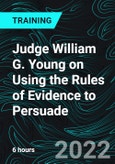Join Judge William G. Young of the U.S. District Court for this popular series on evidence and trial practice. Using the Rules of Evidence to Persuade takes you through the essentials of discovery, motion practice and trial. Don’t miss this unique opportunity!
Evidence and Discovery
The theory and types of relevance; burdens, standards, and methods of proof; the prima facie case; burdens of production and persuasion; habit and routine; relevant but inadmissible; guilty pleas; collateral source; rape shield provisions.
Trial preparation; interrogatory and deposition practice; requests for entry on land and admission; litigation support services; preparation of demonstrative aids; time line; “waves” of discovery; multi-district practice; preparation of the trial book.
Experts; the law of expert testimony; the GHOSTO rule; qualifying the expert; eliciting and explaining the expert opinion; cross-examination of experts.
Evidence and Motion Practice
Motion practice; forum shopping; District of Massachusetts Cost and Delay Reduction Plan; utilizing motions; class certification; advocacy of motions.
Privileges and confidential data; variety and manners of privileges.
Presumptions and judicial notice; conclusive relationships based on social policy; the rule of deference to legislative fact-finding.
Evidence at Trial
Trial procedures; jury empanelment; taking objections and making the record; motions for directed verdicts; requests for jury instructions; requests for findings and rulings; time limits; roles of the courtroom deputy clerk and court reporter.
Direct and cross-examination techniques and structure; the five W’s; leading questions; order of witnesses; the adverse witness; scope of interrogation.
Impeachment; grounds for impeachment and techniques; prior inconsistent statements and convictions; the three Cs; impeachment through evidence.
Theory of rule against hearsay; the M theory; four major groups of exceptions; hearsay within hearsay; rebutting hearsay testimony; confrontation clause; prior statements of witnesses; “reliable” and “necessary” exceptions.
Evidentiary foundations; the ARBPHU rule; the submission and use of tangible evidence; arguments at trial; the opening statement; closing argument.
Evidence and Discovery
The theory and types of relevance; burdens, standards, and methods of proof; the prima facie case; burdens of production and persuasion; habit and routine; relevant but inadmissible; guilty pleas; collateral source; rape shield provisions.
Trial preparation; interrogatory and deposition practice; requests for entry on land and admission; litigation support services; preparation of demonstrative aids; time line; “waves” of discovery; multi-district practice; preparation of the trial book.
Experts; the law of expert testimony; the GHOSTO rule; qualifying the expert; eliciting and explaining the expert opinion; cross-examination of experts.
Evidence and Motion Practice
Motion practice; forum shopping; District of Massachusetts Cost and Delay Reduction Plan; utilizing motions; class certification; advocacy of motions.
Privileges and confidential data; variety and manners of privileges.
Presumptions and judicial notice; conclusive relationships based on social policy; the rule of deference to legislative fact-finding.
Evidence at Trial
Trial procedures; jury empanelment; taking objections and making the record; motions for directed verdicts; requests for jury instructions; requests for findings and rulings; time limits; roles of the courtroom deputy clerk and court reporter.
Direct and cross-examination techniques and structure; the five W’s; leading questions; order of witnesses; the adverse witness; scope of interrogation.
Impeachment; grounds for impeachment and techniques; prior inconsistent statements and convictions; the three Cs; impeachment through evidence.
Theory of rule against hearsay; the M theory; four major groups of exceptions; hearsay within hearsay; rebutting hearsay testimony; confrontation clause; prior statements of witnesses; “reliable” and “necessary” exceptions.
Evidentiary foundations; the ARBPHU rule; the submission and use of tangible evidence; arguments at trial; the opening statement; closing argument.
Course Content
Tuesday 3/15/2022, 4:30 pm - 6:02 pmJudge William G. Young on Using the Rules of Evidence to Persuade: Evidence and Discovery
The theory and types of relevance; burdens, standards, and methods of proof; the prima facie case; burdens of production and persuasion; habit and routine; relevant but inadmissible; guilty pleas; collateral source; rape shield provisions.
Trial preparation; interrogatory and deposition practice; requests for entry on land and admission; litigation support services; preparation of demonstrative aids; time line; “waves” of discovery; multi-district practice; preparation of the trial book.
Experts; the law of expert testimony; the GHOSTO rule; qualifying the expert; eliciting and explaining the expert opinion; cross-examination of experts.
Thursday 3/24/2022, 4:30 pm - 6:31 pm
Evidence and Motion Practice
Motion practice; forum shopping; District of Massachusetts Cost and Delay Reduction Plan; utilizing motions; class certification; advocacy of motions.
Privileges and confidential data; variety and manners of privileges.
Presumptions and judicial notice; conclusive relationships based on social policy; the rule of deference to legislative fact-finding.
Thursday 3/31/2022, 4:30 pm - 5:57 pm
Judge Young: Evidence at Trial
Trial procedures; jury empanelment; taking objections and making the record; motions for directed verdicts; requests for jury instructions; requests for findings and rulings; time limits; roles of the courtroom deputy clerk and court reporter.
Direct and cross-examination techniques and structure; the five W’s; leading questions; order of witnesses; the adverse witness; scope of interrogation.
Impeachment; grounds for impeachment and techniques; prior inconsistent statements and convictions; the three Cs; impeachment through evidence.
Theory of rule against hearsay; the M theory; four major groups of exceptions; hearsay within hearsay; rebutting hearsay testimony; confrontation clause; prior statements of witnesses; “reliable” and “necessary” exceptions.
Evidentiary foundations; the ARBPHU rule; the submission and use of tangible evidence; arguments at trial; the opening statement; closing argument.
Please Note
This webcast is delivered completely online, underscoring their convenience and appeal.
There are no published print materials. All written materials are available electronically only.
They are posted 24 hours prior to the program and can be accessed, downloaded, or printed from your computer.
Speakers
FacultyHon. William G. Young,
U.S. District Court, District of Massachusetts, Boston








